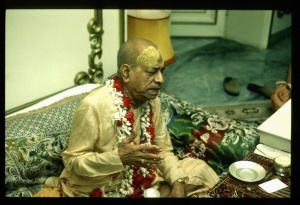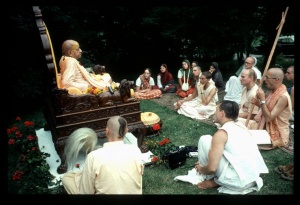SB 10.10.27

A.C. Bhaktivedanta Swami Prabhupada
TEXT 27
bālena niṣkarṣayatānvag ulūkhalaṁ tad
dāmodareṇa tarasotkalitāṅghri-bandhau
niṣpetatuḥ parama-vikramitātivepa-
skandha-pravāla-viṭapau kṛta-caṇḍa-śabdau
SYNONYMS
bālena—by the boy Kṛṣṇa; niṣkarṣayatā—who was dragging; anvak—following the dragging of Kṛṣṇa; ulūkhalam—the wooden mortar; tat—that; dāma-udareṇa—by Kṛṣṇa, who was tied by the belly; tarasā—with great force; utkalita—uprooted; aṅghri-bandhau—the roots of the two trees; niṣpetatuḥ—fell down; parama-vikramita—by the supreme power; ati-vepa—trembling severely; skandha—trunk; pravāla—bunches of leaves; viṭapau—those two trees, along with their branches; kṛta—having made; caṇḍa-śabdau—a fierce sound.
TRANSLATION
By dragging behind Him with great force the wooden mortar tied to His belly, the boy Kṛṣṇa uprooted the two trees. By the great strength of the Supreme Person, the two trees, with their trunks, leaves and branches, trembled severely and fell to the ground with a great crash.
PURPORT
This is the pastime of Kṛṣṇa known as dāmodara-līlā. Therefore another of Kṛṣṇa's names is Dāmodara. As stated in the Hari-vaṁśa:
- sa ca tenaiva nāmnā tu
- kṛṣṇo vai dāma-bandhanāt
- goṣṭhe dāmodara iti
- gopībhiḥ parigīyate
SB 10.10.28
2008-03-17T12:26:01Z
Acyuta
2

A.C. Bhaktivedanta Swami Prabhupada
TEXT 28
tatra śriyā paramayā kakubhaḥ sphurantau
siddhāv upetya kujayor iva jāta-vedāḥ
kṛṣṇaṁ praṇamya śirasākhila-loka-nāthaṁ
baddhāñjalī virajasāv idam ūcatuḥ sma
SYNONYMS
tatra—there, on the very spot where the two arjunas fell; śriyā—with beautification; paramayā—superexcellent; kakubhaḥ—all directions; sphurantau—illuminating by effulgence; siddhau—two perfect persons; upetya—then coming out; kujayoḥ—from between the two trees; iva—like; jāta-vedāḥ—fire personified; kṛṣṇam—unto Lord Kṛṣṇa; praṇamya—offering obeisances; śirasā—with the head; akhila-loka-nātham—to the Supreme Person, the controller of everything; baddha-añjalī—with folded hands; virajasau—fully cleansed of the mode of ignorance; idam—the following words; ūcatuḥ sma—uttered.
TRANSLATION
Thereafter, in that very place where the two arjuna trees had fallen, two great, perfect personalities, who appeared like fire personified, came out of the two trees. The effulgence of their beauty illuminating all directions, with bowed heads they offered obeisances to Kṛṣṇa, and with hands folded they spoke the following words.